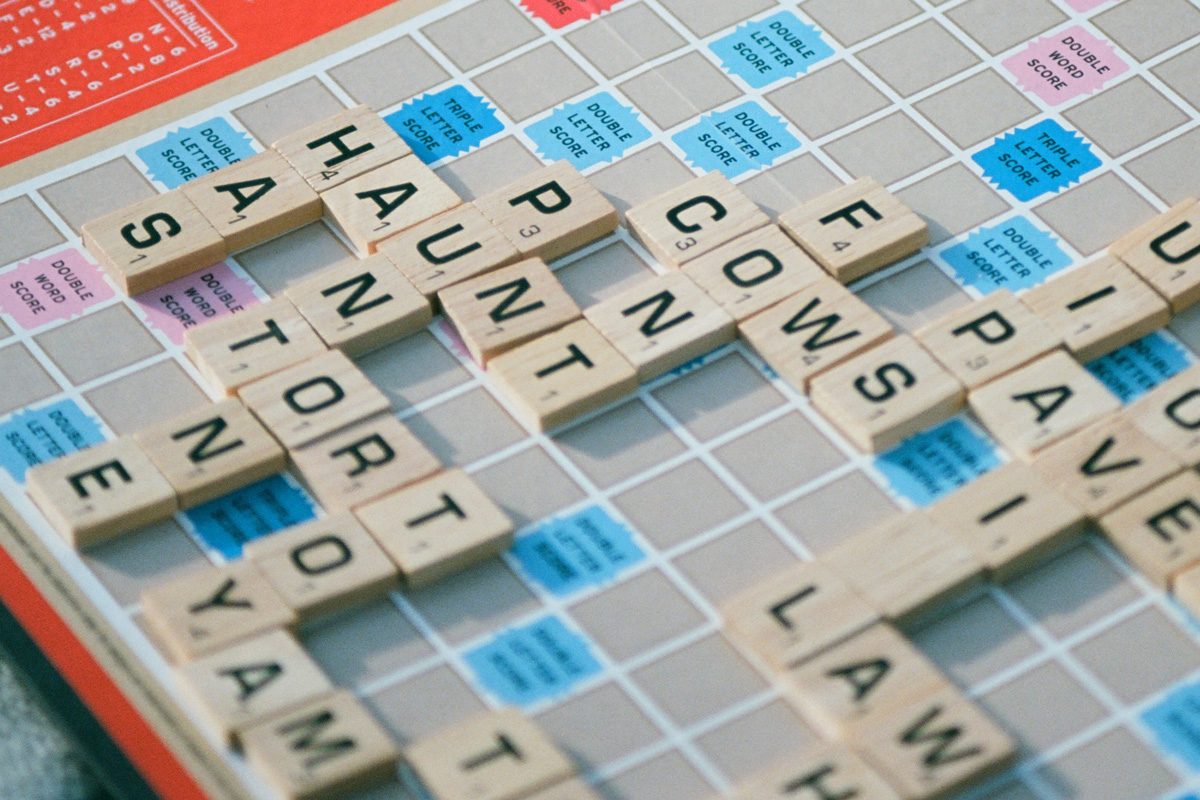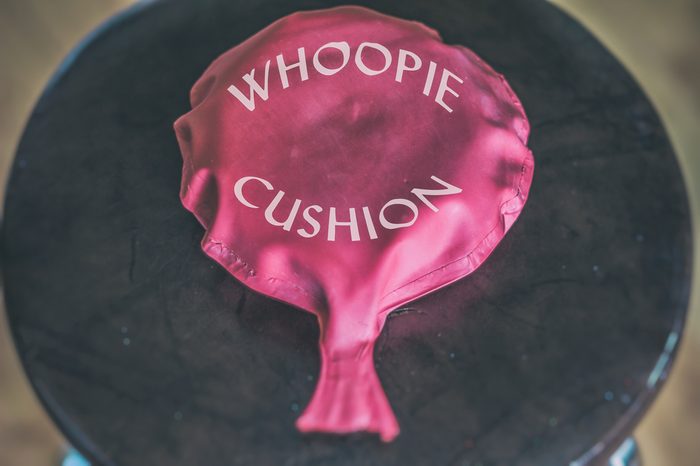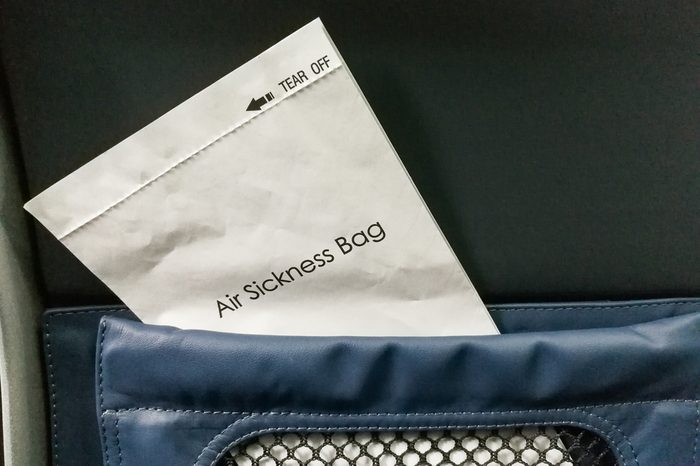Hint: You won't want a gift in Germany

17 English Words with Different Meanings in Other Languages


Brat
Siblings of little bros around the world already know the Russian word for brother: brat (or брат in the Cyrillic script). In English, brat has a more negative connotation, and its roots go back to the 1500s when it began to be used as slang for an annoying or spoiled child. Merriam-Webster says brat could be derived from the word for a coarse garment, which beggar children might wear. Poor little brats!

Fart
European languages love the word fart, but not in the same way as English speakers. In Norwegian, Danish and Swedish, fart is the word for speed, particularly with regard to moving objects. For example, if you see I Fart on a sign outside an elevator in Denmark, it means the elevator is in use. Fartplan refers to a transit schedule, and road signs say fart-kontrol to tell you to watch your speed. The variation fahrt means a journey or drive in Germany. Have a safe journey! Or, gute Fahrt!

Gift
In Scandinavia the word gift has two meanings, depending on the context. The first is married, which makes sense because it derives from old English words for wedding gifts or dowries. The second meaning is a little less celebratory: Gift is the word for poison in Danish, Norwegian and Swedish (German, too). It probably derives from an archaic verb form of to give—because what is poison for if not to give to someone?

Crap
The next time you’re in Romania, don’t call anything crap unless you want someone to hand you a fish sandwich. They did the old switcheroo on the letters a and r, so carp, the fish, became crap. We’re sure that sandwich is delicious, if a little less appetizing for English speakers.

Mist
Mist has such delicate and dewy connotations in English, but that’s definitely not universal. Here, the word signals all things gentle and ephemeral, but it has the opposite meaning in Germany, where it’s the word for manure, dung and general garbage. You can also curse with it: Mist! It’s easy to get away with around English speakers.

Kiss
In English, kiss comes from Old English variants of kyss or kussen, which means to kiss or touch with the lips. They still spell it with a y in Sweden, but when it’s spelled with an i over there, kiss can translate to another common noun that has absolutely nothing to do with kissing: urine. You could definitely catch someone off guard if you lean in for the wrong kind of kiss!

Barf
What’s lovelier than a blanket of freshly fallen barf? Or as peaceful as a barf-capped mountain? In Hindi, Urdu and Farsi, the word barf means snow. Do you wanna build a barfman?

Cookie
Things can get extra wacky when it comes to anatomical terms in other countries. For instance, in France you say bite (pronounced like beat) for penis. And in Hungary, you say koki, pronounced like cookie, if you’re referring to a small penis. Take it from us: The next time you want a sweet treat in Europe, choose those words carefully.

Salsa
In American phonetics, salsa sounds a lot like the Korean word for something decidedly less delicious: diarrhea. The actual Korean word is seolsa, but that’s pretty darn close. And in related news, the Japanese word for diarrhea sounds like Gary. Sorry to all the Garys out there!

Peach
If you’re shopping for fresh produce in Turkey, be careful when you ask for a peach. Your request might be confused for something that won’t be good for your cobbler recipe: bastard. Piç, which sounds a little like peach if it’s said quickly, is the Turkish word for what people used to call an “illegitimate” child.

Preservative
Preservatives in food help prevent mold and deterioration. You could say they act as a form of protection. Same thing in France … except slightly different. Preservative, or preservatif, means condom in French.

Bra
The word bra, short for the French word brassiere (a fancy word for a woman’s undergarment), has been around in English since the 1930s. But Swedes use the word bra to mean good. Bras are good, but there’s no connection between the Swedish meaning and the article of clothing. In Sweden, it’s a shortened version of the Italian word bravo. Bravo, brassieres!

Smoking
We think of smoking as something you do, but in France, it’s something you wear. Smoking is the French word for tuxedo. James Bond and chic dudes everywhere know this is beautiful serendipity. Time to put on your smoking jackets and cigarette pants so you can look smoking hot! Ooh la la!

Payday
Payday is a time to celebrate in English, and it’s also a yummy candy. But in Portugal, it’s one of the english words with different meanings in other languages. The word peidei (which sounds exactly like payday) translates to “I fart.” No thank you! This funny word is definitely not the kind of payment anyone is hoping for.

Face
Time to talk wacky anatomy again. The French word fesse is pronounced similar to face. Except it means, ahem, buttock. Pardon our French!

LOL
Before textspeak acronyms and emojis took over, the English catchall for laugh out loud was already going strong in the Netherlands. In Dutch, lol is the word used for lark, fun, pranks and all kinds of general amusement.

Air
If you get thirsty in Indonesia, ask for a glass of air, which is the word for water. Huh? If that’s the exact opposite word you’d think it should be, you’re not alone. Luckily, it’s pronounced “ah-yeer,” so there’s not much chance for confusion unless you’re reading it. (The Indonesian word for air is udara.)
Why trust us
At Reader’s Digest, we’re committed to producing high-quality content by writers with expertise and experience in their field in consultation with relevant, qualified experts. We rely on reputable primary sources, including government and professional organizations and academic institutions as well as our writers’ personal experiences where appropriate. We verify all facts and data, back them with credible sourcing and revisit them over time to ensure they remain accurate and up to date. Read more about our team, our contributors and our editorial policies.
Sources:
- Merriam-Webster: “Brat”
- Cambridge Dictionary: “Speed”
- Cambridge Dictionary: “Swedish-English Dictionary”
- Cambridge Dictionary: “Russian-English Dictionary”
- Cambridge Dictionary: “Indonesian-English Dictionary”
- Cambridge Dictionary: “French-English Dictionary”
- Cambridge Dictionary: “German-English Dictionary”
- Word Hippo: “Diarrhea”
- Word Hippo: “What does piç mean in Turkish?”
- Lingowar: “21 common borrowed words from other languages”




















